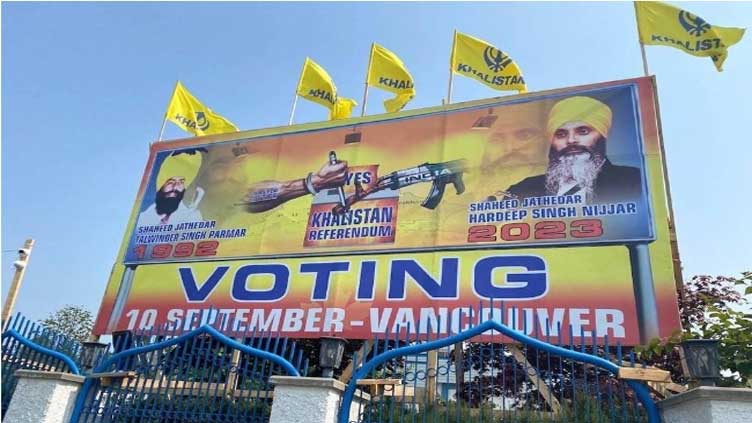SFJ mobilizes thousands for Khalistan referendum voting in Vancouver

World
SFJ mobilizes thousands for Khalistan referendum voting in Vancouver
VANCOUVER, CANADA (Haseeb Arsalan) - Another Khalistan referendum, organised by the US-based Sikhs For Justice (SFJ) group, is set to take place in Vancouver, Canada, on September 10 (Monday) in Surrey BC at the Guru Nanak Sikh Gurdwara.
This is the same Gurdwara that Hardeep Singh Nijjar, head of the Canadian chapter of Khalistan referendum, was the president of and was assassinated on June 18.
Pro-Khalistan Sikh groups have accused the Indian government of the killing of a famous Khalistani activist.
A US-based secessionist group, Sikhs For Justice (SFJ) has said, “It hopes that the Khalistan referendum voting at the Guru Nanak Sikh Gurdwara will attract a historic number of Sikhs who live in Vancouver.”
It’s estimated that more than 750,000 Sikhs live in Canada – the largest number outside of India – but Sikh groups say, “The real number is around one million, who have left India to make Canada their home.”
These referendums, initiated at the UK’s Queen Elizabeth Centre in 2021, have been conducted in more than two dozen cities worldwide.
A similar referendum took place in London in November 2021, with an estimated participation of up to 12,000 individuals.
Over the past three years, the voting process has transformed into a mobile event within Sikh communities, involving approximately 208,000 Sikhs across various countries. These referendums aim to support the liberation of Indian Punjab and the establishment of an autonomous Sikh state.
The referendum voting has occurred in five UK cities, as well as in France (Paris), Italy, Switzerland and three cities each in Canada and Australia.
In India, Sikhs are a religious minority within the 1.4 billion population, but constitute the religious majority in the state of Punjab, where Hinduism is the second most practiced faith. The referendum’s goal is to secure agreement within Sikh communities for the creation of Khalistan, a separate homeland within India, often proposed through the partition of Punjab, the only Sikh-majority state.
In 2018, the group announced ‘Referendum 2020’, seeking the liberation of Punjab from Indian occupation. The first Khalistan referendum took place in the UK in October 2021, with 30,000 Sikh participants.
A similar event occurred in Geneva in December 2021, where over 6,000 individuals voted for a sovereign Sikh state. Italy saw the participation of 62,000 Sikhs, and Canada recorded a significant turnout of approximately 110,000 participants.
In support of the demand for a separate Sikh homeland, more than 17,000 Sikhs voted for the Khalistan referendum in Rome, Italy. The UK, with a substantial Sikh diaspora, organized campaigns under the advocacy of SFJ. Over 42,000 Canadian Sikhs participated in the Khalistan referendum in Malton, Mississauga, in July.
The roots of these referendums trace back to the traumatic event of Operation Blue Star in 1984 when the Indian army stormed the holiest Sikh shrine, the ‘Golden Temple’, ostensibly to capture alleged terrorists. This operation resulted in the loss of innocent Sikh lives and a profound disrespect for Sikh sentiments.
Many Sikhs sought refuge in countries like the UK, Canada, Italy, and the US to escape the insecurity in their homeland.
Mass genocide and extrajudicial killings have been employed by the Modi regime against the Sikh community. In response, Sikh diaspora groups like SFJ have organized referendums, protests, and advocacy efforts to assert Sikh rights on various platforms. The Punjab Referendum Commission (PRC) has been established to facilitate fair voting for this fundamental demand.
For India to genuinely uphold democratic principles, it should recognize the results of the Sikh referendums, potentially paving the way for an official referendum on the matter. This would align with the principles of freedom, human rights, and liberties that democracies uphold.
India’s suppression of these movements and referendums infringes upon the rights of its minorities and denies them the right to self-determination through peaceful means.

